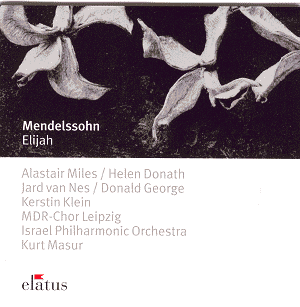Mendelssohn’s great oratorio has been lucky on disc. Its post-Bachian dramatic urgency and wealth of memorable solos, duets and choruses have ensured its status and obviously inspired conductors to give of their best. This particular version makes a welcome return at mid-price and, although in a slightly higher price band, complements Masur’s Apex reissues of the Mendelssohn symphonies that I gave the thumbs up to recently.
In fact this recording was the recipient of a coveted Gramophone award in 1993, as well as being selected by the now defunct Sounds in Retrospect panel, which concentrated on sonic and audio excellence. The qualities that prompted these accolades are immediately evident. The brilliantly incisive choral contribution is nothing short of magnificent, as we should perhaps expect from the famous Leipzig Radio forces. Their crisp, disciplined attack is as good as any on disc, as is their sensitive, ethereal tone in such numbers as track 12 (disc 1) Wohl dem, der den Herrn fürchtet.
As in those symphony recordings, Masur shows himself to be no slouch in Mendelssohn. His vigorous, no-nonsense approach shows sympathy with the historically aware camp, and it is welcome in music that can suffer from the accretions of a tradition where slow and ponderous speeds were the norm. Number after number benefits from having the cobwebs blown away in this manner and Mendelssohn’s sheer sense of drama emerges with more conviction than ever. One could even go as far as to say the work emerges in a quasi-operatic fashion, possibly controversial to some but surely an entirely valid, and certainly vividly exciting view.
The soloists also contribute enormously to the success of the performance. They are led by the sonorously authoritative Alastair Miles. He is now an experienced ‘old hand’ in this work but here in 1993 the voice has a youthful firmness that, coupled with such imaginative delivery of the text, makes for a memorable assumption. He may not have the rich lower texture of, say, Bryn Terfel (for Paul Daniel) but he is at least as characterful with the words and has an advantage in some of the higher solos.
We sense the courage and conviction of Elijah’s vision as he confronts Baal’s followers in ‘Ist’s nichts des Herrn Wort’ and the calm serenity of the Bachian ‘Ja, es sollen wohl Berge weichen’.
The experienced Helen Donath and Jard van Nes (a Haitink favourite in this work) are equally arresting and intelligent, and only Donald George as Obadiah disappoints slightly. He is certainly fresh voiced but no match for the variety and subtlety of Peter Schreier (Sawallisch – Philips).
Though not this conductor’s usual band, the orchestra nevertheless responds to Masur’s sprightly pacing with alertness and dexterity, and there are many moments of great character and spontaneity. The booklet gives no recording details, but the venue seems ideal, with just the right amount of resonance, and choir and soloists are superbly caught by the engineers. Full text and translations complement good liner notes. A real bargain in this work.
Tony Haywood

